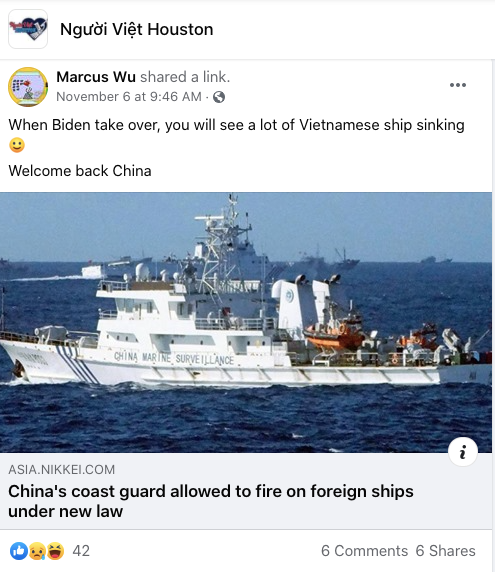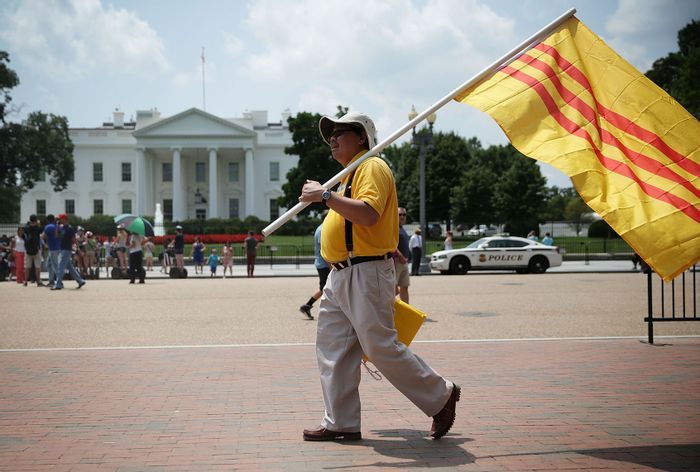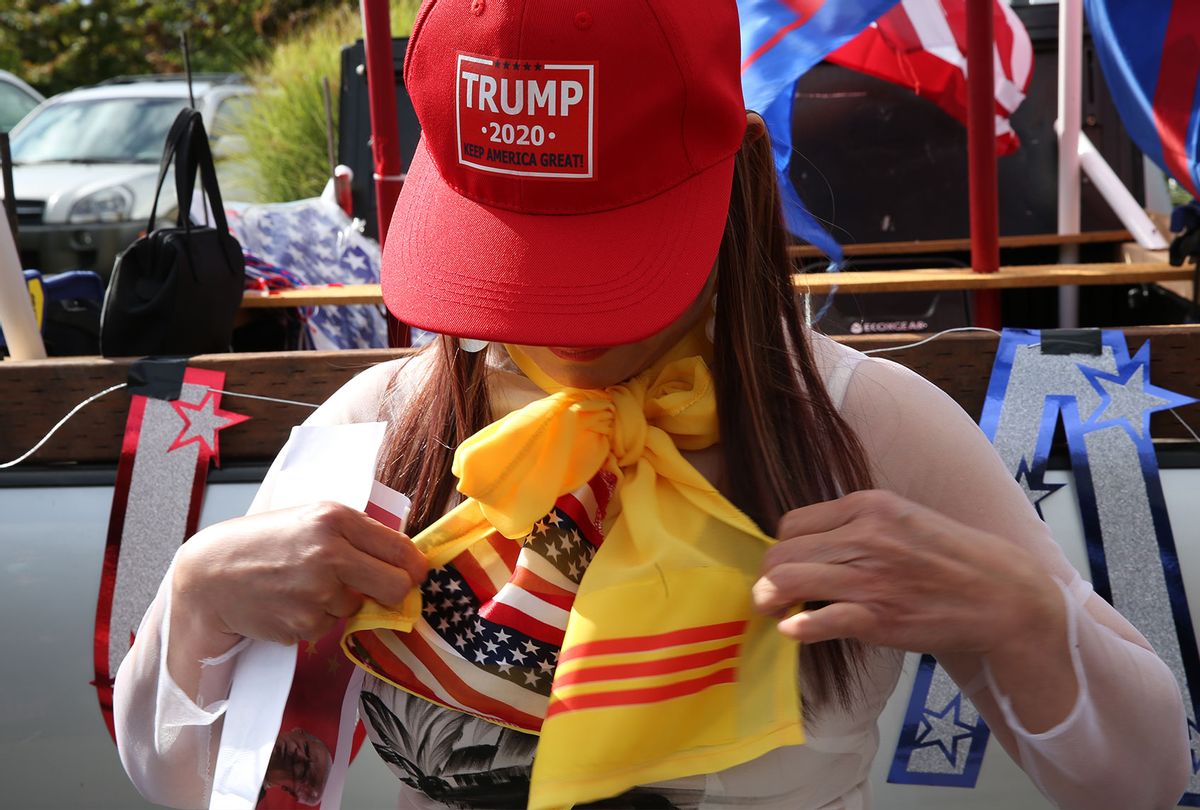Would I mention at my grandparents' funeral that they had voted for a white supremacist? If I had penned my late father's obituary, would I have publicly denounced his anti-Blackness while listing his best qualities? I bring up such taboo ideas to suggest that we should live in a world where I can examine aloud the negative impact left behind by my loved ones.
Joe Biden is the projected winner to take the office of presidency from incumbent President Donald Trump. But so rooted is white supremacy in the foundation of this country that millions of Americans still voted for the Trump administration despite the racist rhetoric, the 240,000 deaths as a result of the administration's mishandling of the ongoing coronavirus pandemic, and the family separation policies at the border. The Trump administration intensified the white supremacist structure in the USA, and white supremacy will not die out with Trump's dethroning.
That means dealing with the knowledge that my neighbors and family members voted for Trump, civility be damned. Some of my friends are abandoning their Trump-voting relatives. As a first-generation Vietnamese American, I largely burned a bridge with my paternal grandparents, my Ông nội and Bà nội, over their support of Trump. According to my relatives, bombarding my grandmother's private messages with information – the news surrounding Trump's infidelities, the sexual assault accusations against him, the migrant family separation at the border, the Muslim ban – was toxic. When I saw my grandmother sharing a "Women for Brett Kavanaugh" video on Facebook, I also let loose a storm of articles focusing on Christine Blasey Ford's testimony. What example was she setting for her granddaughters and grandsons by supporting Trump's appointment of an accused rapist?
My relatives tried to explain my grandparents' unwavering support for the Trump administration. Due to centuries-long tensions with China and how Chinese military ships have terrorized and threatened Vietnamese fishing boats, many Vietnamese Americans gravitate toward the Trump administration's anti-China stance. This is exacerbated by massive consumption of misinformation from right-wing sources on YouTube, through incendiary Facebook conspiracy posts, and Fox News. And unfortunately, the language barrier prevents them from accessing credible English-language sources to counter this barrage.

This Trump sympathy has created conflict across generations in Vietnamese American households, with progressive-leaning Vietnamese youths challenging their parents' conservatism. "You're smart and informed, Caroline, but grandmother is wiser," my liberal-leaning aunts would tell me, holding me to the expectation that I unconditionally respect my elders. They'd insist I avoid talking politics to keep the peace.
But then my grandmother brought up her vote for Trump, stating blithely that he would undo the damage caused by Democrats.
When I stated how undocumented immigrants deserve better treatment, my grandmother would just reply, "It's okay, it's okay," believing we can just agree to disagree. You would think the argument, "If America took you in your time of need, why can't others seek shelter here like you?" would sway certain Vietnamese elders' sympathies for undocumented immigrants mistreated by Trump's border policies, but it doesn't. I have witnessed the dismissive attitudes of Vietnamese refugees toward the undocumented – or "illegals" as they call them – because they believe the latter did not get into the America the right "legal" way. Many Vietnamese perceive themselves as the immune "good immigrant," despite many Vietnam War refugees facing deportation under the Trump administration.
It does not add up that many in the Vietnamese community continue to significantly back Trump against their own interests. Another example of this contradiction: The Vietnamese American community, including my grandparents, have high regard for John McCain, because he too experienced the traumas of the Vietnam War, and as a POW experienced torture at the hands of the North Vietnamese. But they still didn't turn on Trump when he denigrated McCain, saying, "I like people that weren't captured."
When voting for Trump, my grandparents support white supremacy by adjacency, unmindful of its impact. "They're just naive to the atrocities of the Trump administration, but they're not going to change their mind," an aunt explained. My grandmother might have entertained the idea of me engaging in social justice for communities of color by assuring me she respects my efforts, but she and and my grandfather did not care to factor in social justice into their votes or consider that their votes made my work more difficult and emotionally straining. I haven't seen them in person since.
My grandparents aren't outliers among the Vietnamese American community. During Texas' early voting week, Houston Chronicle reporter Zach Despart tweeted stats that revealed over 8,800 of voters with the "Nguyen" surname had already cast their ballots in Harris County. Some saw that number as a positive sign, bringing attention to Vietnamese Americans' potential voting impact, but sirens went off in my head. According to a 2020 Asian American Voter Survey, 48% of Vietnamese Americans surveyed expressed support for Donald Trump. So many of those "Nguyens" who had voted early are likely the same ones to call me "communist" or "socialist" in my text-banking work and proceeded to bubble in "Donald Trump" on the ballot.
Another example of the bipartisan divide within the community occured earlier this year. In my home city of Houston with a population of about 120,000 Vietnamese, 50-year-old insurance agent Lê Hoàng Nguyên purchased a Black Lives Matter billboard to decry the police murder of George Floyd. His fellow Vietnamese Houstonians eviscerated him with criticism, death threats, lynching threats even. Anti-Blackness is rampant in our community.
The model minority myth inflames these divisions. Perceived Asian success (ignoring poverty rates among Asians) is weaponized against the perceived failure of Black and Brown communities. Vietnamese social media Facebook groups, run by vocal pro-Trump admins and moderators, will blame Black communities for the abuse they suffer at the hands of police. Users would post rhetoric like, "They shouldn't commit crimes to get arrested." Sanitized B&W photos of "peaceful" Civil Rights marchers were weaponized to denounce the assumed rioting associated with the Black Lives Matter movement (never mind that that 93% of the protests were peaceful and that fixation on rioting erases the social injustices that fuels desperation). A Houston Vietnamese group even circulated footage of George Floyd's final moments and claimed the police were the real victims, and the media and Black Lives Matter marchers were overreacting to the killing.
For Vietnamese children who have the psychological energy to engage, you can try to foster better understanding with your loved ones. It prevents that burden from falling onto those who are most impacted by the Trump administration. Challenge them by discussing Black Lives Matter marches and how racism in America did not end with the Civil Rights Movement. Other methods include encouraging them to change their social media diet and abstain from misinformation-filled platforms like YouTube or Facebook, and recommend they read Viet Fact Check, which weighs out and debunks misinformation within the Vietnamese community by bridging the language barrier. It's not easy. When Lê Hoàng Nguyên educated his mother about the Black Lives Matter movement against systemic injustice, his mother concluded, in his words, "If Black people know that Vietnamese people support them . . . maybe then they will support us and not rob us anymore." Using the lowest standards, his mother's self-serving conclusion was progress.
More encouragingly, look to Philippa PB Hughes, the cousin of ICE director Tony Pham, who challenged his loyalty to the Trump administration and pointed out the hypocrisy in his own "lawful path to citizenship" narrative that he used to uphold his model minority status. Furthermore, I've come across a few success stories in "Asian American with Republican Parents Support Group," in which children have helped their older relatives understand the racial history that has haunted the country that accepted them as refugees.
Education doesn't have to stop with current Trump supporters though. I would go so far as to advise being open about your family members' conservative voting record and principles even after their deaths; put it on their obituaries. I could be accused of speaking ill of the dead, but although they've passed, the negative consequences of their actions haven't. I could tell my hypothetical children and grandchildren that "my grandparents were resourceful and courageous in the face of adversity as refugees – but let it be acknowledged that they played their part in causing harm to other migrants." I can honor my grandparents' sacrifice and survival when they fled Saigon with nothing but the clothes on their back in 1975. I can thank my grandmother for the bowls of beef and chicken phở noodles. I can thank her for cash-filled red envelopes on Lunar New Year. But I cannot erase that her support enabled the blatant white supremacy that ripped apart migrant families. This is her legacy as much as the good she's done. I would expect my hypothetical children and friends to do the same for me should I do or say anything against the grain of justice. Hold previous generations accountable in order not to repeat their mistakes.
I say this because it would have helped if my father's shortcomings were articulated to me when he died. My father, the only son my Bà nội raised, subverted strict Vietnamese mores — all while he simultaneously upheld it. He was an outspoken pro-Bush, pro-McCain Republican. At the advice of Bà nội, he had us light incense and pray on our knees to Buddha for John McCain to beat Barack Obama in 2008. Although my father never lived past 2010, he had once mentioned to me with disgust how Donald Trump wanted to run for president, not believing this man existed.
While I'd like to believe my father's loyalty to the Republican Party would have never driven him to overcome his distaste for Trump, he left behind the burden of a reckoning with his anti-Blackness within my family. He was a father who lectured to me and my brother that N-word and the news reports of nooses in neighborhoods were racist, but I also remember how he snarled "the police officer was just doing his job," when Henry Louis Gates Jr.'s wrongful arrest stirred outrage. He also commented, "college students vote for Obama because they don't want to seem racist" and ranted, "when I said to the canvasser I wasn't going to vote for Obama, two African-American women looked at me like I was useless." As an impressionable middle-schooler who idolized him, I sided wholly with his grievances and absorbed these sentiments like a disciple, but time and experience later taught me otherwise. Discussing these uncomfortable truths allows me to evaluate what went wrong and how to identify microaggressive anti-Blackness in Asian spaces, like social media or other parts of my family circle.

I haven't completely withdrawn from my grandparents. I send Vietnamese-language letters — typing them in English, passing them to Vietnamese-literate friends for translation, then handwriting the Vietnamese — to them to inform them about my efforts to observe the grievances of the Vietnamese community and distribute information that bridges language barriers. Knowing my grandparents' rationalization for supporting a figure like Trump challenges me to engage the nuances of my Vietnamese community and heritage. But I maintain personal distance. I ignore their pleas of "I miss you, please come visit" or even my relatives urging me to answer their calls. Letter-writing helps me process my thoughts better than phone calls since I cannot speak their mother language. Mainly, I am protecting my mental health. But I also wish that my grandparents absorb my absence as a consequence because they could not confront the consequences others must suffer under the Trump administration, which they supported.
My mother reports that as they age, my grandfather is barely eating and grandmother has memory lapses. Am I going to regret not seeing them again before their demise? I am ready to grapple with complicated emotions, but I will look back and understand my distance. After all, mourning a loved one should include mourning what a person could have been.



Shares